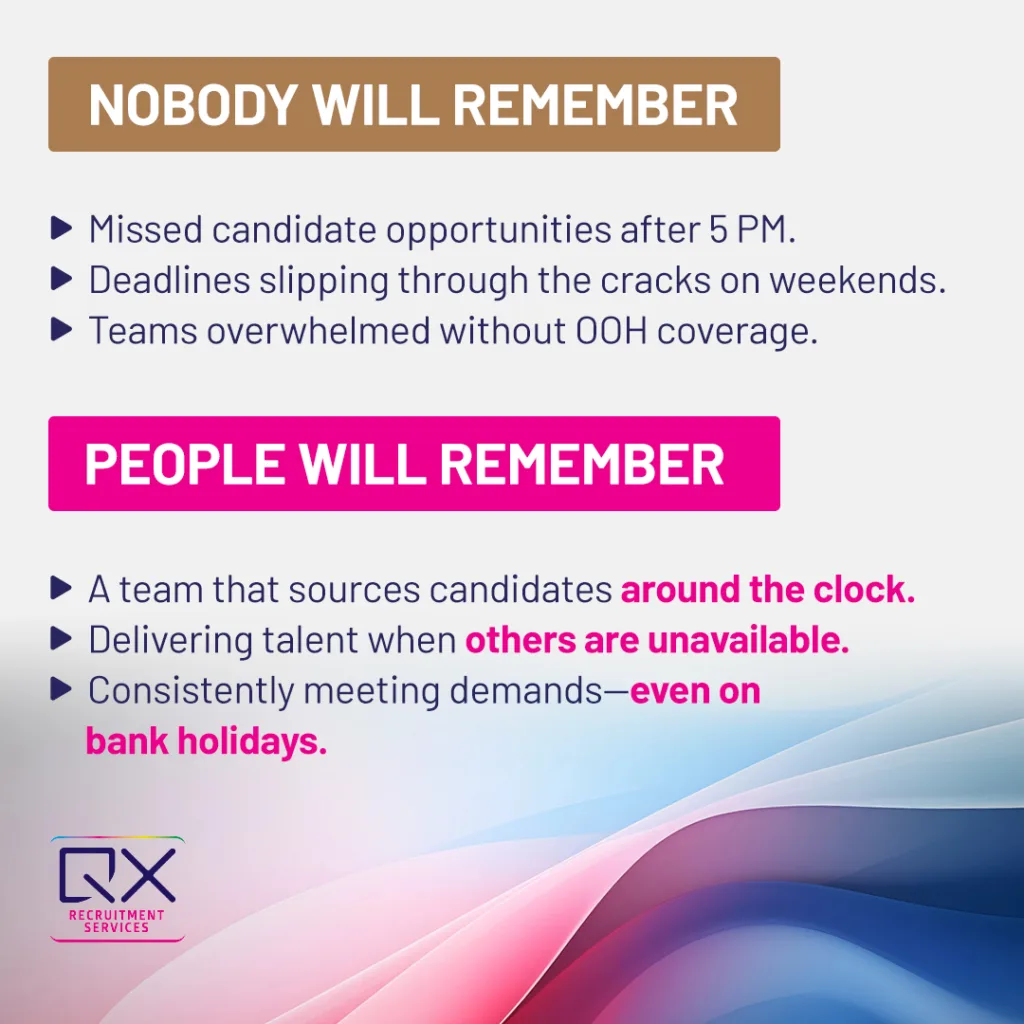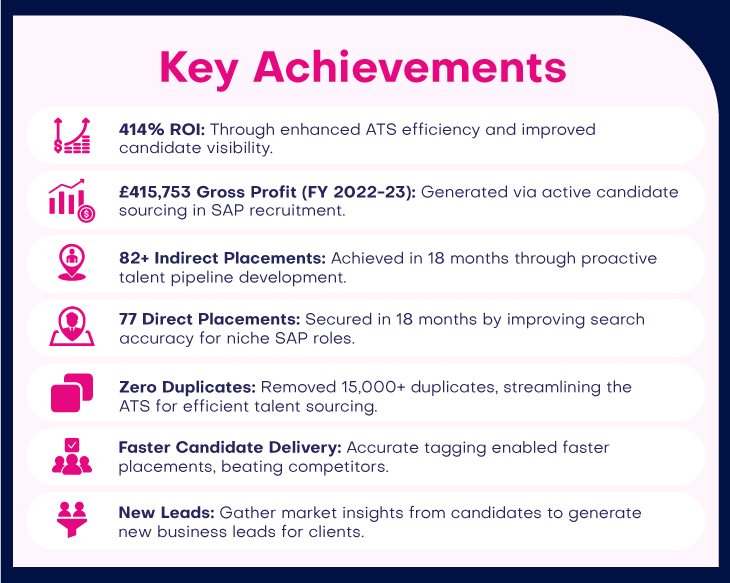Topics: Talent Acquisition Strategy, UK Outsourcing
Posted on September 25, 2024
Written By Abishek Balakumar

With 77% of UK employers finding it difficult to source appropriate candidates, the market gap is huge. Additionally, the SHRM reports that organisations which have successful talent acquisition strategies are 3.5 times more likely to be in the top class of performances within their industry. In this regard, therefore, the call for a standardised recruitment process cannot be exaggerated.

The other most serious disadvantage of most companies is that different recruitment processes for each department generally usually lead to inefficiencies, poor candidate experience, and compliance risks. This is because the business fails to attract and retain the best talent in a market in which 90% of employers claim that the top priority is the attraction of talent (SIA).
TA processes are very intricate, and this intricacy demands a rather strong strategy to normalise the whole affair. Business must understand the reality that every stakeholder, from the candidate to the hiring manager, should be treated positively at each and every stage of the recruitment journey. In pursuit of growth, companies require an effective methodology through which change in TA processes can be implemented.
Standardisation of recruitment processes has many edges to it, which can heavily contribute towards the growth of the organisation. A common process minimises inefficiencies and provides hiring managers with the most suitable candidates for each position.
Such framework can be created by the companies, which will help in defining the roles and responsibilities of the hiring processes. In order to clarify this, it can be mentioned that recently, an NHS trust collaborated with one of the major recruitment outsourcing firms and implemented the framework under accountability right from a recruitment coordinator to hiring manager, ensuring the process was structured. This change also included creating a recruitment guide and an FAQ document, all of which contributed to an easier flow of work.
An advanced ATS is capable of adding value through tech-enabled solutions, like self-scheduling interviews and on-demand video interviews. To the point, it is transforming the application process for an organisation. These innovations, on the one hand, make it easier for the candidate but, on the other hand, they arm hiring managers with valuable insights about recruitment metrics to arrive at better-informed decisions.
Compliance represents a crucial factor in the UK outsourcing and offshoring sector’s recruitment strategy. Non-adherence to industry standards and requirements puts the business at risk regarding compliance risks that could potentially harm the business.
A robust recruitment process builds assurance that all the departments operate within compliance standards, which is paramount to the correct functioning of the organisation. APSCo claimed that 54% of recruiters found it challenging to maintain their compliance due to changes in regulation. Standardisation of recruitment practices ensures that compliance integrates into the process, thus reducing potential risks.
In addition to all this, data analytics from the ATS lets organisations track compliance comprehensively. Real-time dashboards and reporting let companies keep a tab on metrics around candidate sourcing, screening, and hiring quickly so that any potential compliance issues are identified promptly.
Technology plays a critical role in contemporary talent acquisition as well. Organisations can scale their hiring strategy with the use of the right digital tools.
Advanced recruitment technologies can integrate well with businesses to improve their TA processes significantly. For example, AI-driven tools can simplify the sourcing and screening of candidates so that hiring teams can focus on developing relationships with top candidates. Thus, according to SHRM, technology-enabled recruitment solutions have an impact in bringing the time-to-hire down by as much as 50%.
In addition, a culture of improvement through training and development will ensure that teams are always kept on the competency curve regarding these technologies. In the same vein, training programs for recruitment staff are an added avenue in which they can achieve the maximum benefits that new systems offer.
The right balance in talent acquisition should also incorporate strategies to attract diverse talent. With a call for greater diversity within hiring practices now being so pertinent, such calls have never been so critical in the UK.
DEI should be at the center of any recruitment strategy. The organisations that focus on DEI do not only enhance the workplace culture but also expand their talent pool. According to SIA, organisations with diverse teams have a likelihood of 35 percent to perform better against the competition.
To create a deliberate method to attract underrepresented talent, there needs to be outreach, like being involved with minority-serving institutions, attending diversity job fairs, and leveraging digital sites that shine a spotlight on diverse talent. The commitment includes an openness toward inclusivity: organisations are sure to attract a complete cross-section of candidates who can “innovate” and “be creative.”
Read more: DEI Recruitment (Pays): Unlock 76% More Talent and 22% Lower Turnover
Organisations should concentrate on not only the diversity initiative but on a healthy early career pipeline. This would involve building and nurturing relationships with universities and educational institutions while interacting with students during the conduct of programmes and functions so as to expose them to the corporate culture.
For instance, an outsourcing leader, which outsources some of its services, implemented a university recruitment program that ensured the company touched base with students that were studying in relevant fields. Not only does this bring quality talent to its fold but also positions it as an employer of choice among graduates.
A formal, technology-enabled recruitment process brings clear and measurable outcomes. At a UK-based outsourcing company in the last year, these results were achieved:

Discover how a leading UK tech recruiter transformed their ATS, increased ROI by 414%, generated £415K profit, and streamlined placements through data optimization. Download NOW!
In such an environment that changes with every passing day, the UK outsourcing and offshoring organisations must surely see talent acquisition strategies as the key for transformation. Standardised recruitment process, compliance, technology, and diversity are all foundational building blocks of a broad recruitment structure that would stimulate organisational growth and innovation.
The landscape is constantly changing, and as such, companies that invest in a strategic approach to talent acquisition position themselves for long-term success. Revolutionising talent acquisition does not simply mean filling vacancies but instead building an agile workforce to stay strong and thrive within increasingly competitive environments.

Originally published Sep 25, 2024 09:09:18, updated Sep 25 2024
Topics: Talent Acquisition Strategy, UK Outsourcing